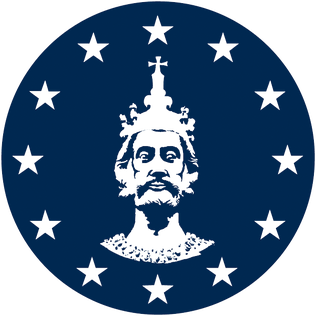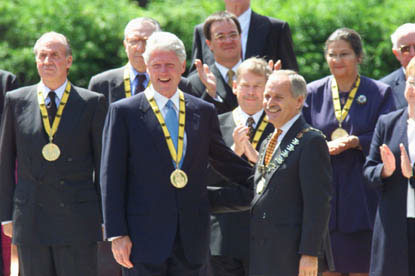Top Qs
Timeline
Chat
Perspective
Charlemagne Prize
Award for work toward European unification From Wikipedia, the free encyclopedia
Remove ads
The Charlemagne Prize (German: Karlspreis; full name originally Internationaler Karlspreis der Stadt Aachen, International Charlemagne Prize of the City of Aachen, since 1988 Internationaler Karlspreis zu Aachen, International Charlemagne Prize of Aachen) is a prize awarded for work done in the service of European unification. It has been awarded since 1950 by the German city of Aachen. It commemorates Charlemagne (German: Karl der Große), ruler of the Frankish Empire and founder of what became the Holy Roman Empire, who was the first to unify Western Europe following the Fall of the Western Roman Empire. Traditionally the award is given to the recipient on Ascension Day in a ceremony in the Aachen Town Hall. In April 2008, the organisers of the Charlemagne Prize and the European Parliament jointly created a new European Charlemagne Youth Prize, which recognises contributions by young people towards the process of European integration. Patrons of the foundation are King Philippe of Belgium, King Felipe VI of Spain, and Henri, the Grand Duke of Luxembourg.[1]

Remove ads
History
Summarize
Perspective

On 19 December 1949, Kurt Pfeiffer presented to the reading group "Corona Legentium Aquensis", which he had founded, his proposals for the prize: "We have the honour of proposing annual presentation of an international prize for the most valuable contribution in the services of Western European understanding and work for the community, and in the services of humanity and world peace. This contribution may be in the field of literary, scientific, economic or political endeavour."
The sponsors of the prize, the city of Aachen, refer to Charlemagne as the "Founder of Western Culture", and assert that under his reign, the city of Aachen was once the spiritual and political centre of the whole of what is now western Europe.
The first Charlemagne Prize was awarded to Richard von Coudenhove-Kalergi, the founder of the Pan-European Movement.
Following the presentation of the award to the Italian Prime Minister Alcide de Gasperi in 1952, the International Charlemagne Prize of the City of Aachen has repeatedly sent messages going far beyond Germany and promoting the "unity of Europe".
The award sponsors assert that the list of Charlemagne Prize winners reflects the history of the European process of unification, commonly referred to as European integration. They continue that it has been awarded to founding fathers of a United Europe such as de Gasperi, Schuman, Monnet and Adenauer, and to those who have embodied hope for integration such as Edward Heath, Konstantinos Karamanlis, and His Majesty Juan Carlos I.
The sponsors promote that the Charlemagne Prize is not only an expression of gratitude for lasting services for the unity of Europe, but also an encouragement and an expression of hopes and expectations directed towards the future. They quote Kurt Pfeiffer: "the Charlemagne Prize reaches into the future, and at the same time it embodies an obligation – an obligation of the highest ethical value. It is directed at a voluntary union of the European peoples without constraint, so that in their newfound strength they may defend the highest earthly goods – freedom, humanity and peace – and safeguard the future of their children and children's children."
In April 2008, the organisers of the Charlemagne Prize and the European Parliament jointly created a new European Charlemagne Youth Prize, which recognises contributions by young people towards the process of European integration.
Fellowship
Since 2019, the Charlemagne Prize Academy has annually awarded fellowships [2] to support researchers working on issues relevant to Europe’s future integration.
Remove ads
Recipients

- Paul-Henri Spaak in the 1957 ceremony
- Bill Clinton, recipient in 2000, along with earlier recipients King Juan Carlos I of Spain, Václav Havel and Simone Veil
- Angela Merkel with the 2008 prize medal around her neck
Remove ads
By country
See also
- European Charlemagne Youth Prize
- Leipzig Human Rights Award, originally called the "Alternative Charlemagne Award", formed in opposition to Clinton's recognition with the award
- Aachen Peace Prize, formed in opposition to Kissinger's recognition with the award
References
External links
Wikiwand - on
Seamless Wikipedia browsing. On steroids.
Remove ads




